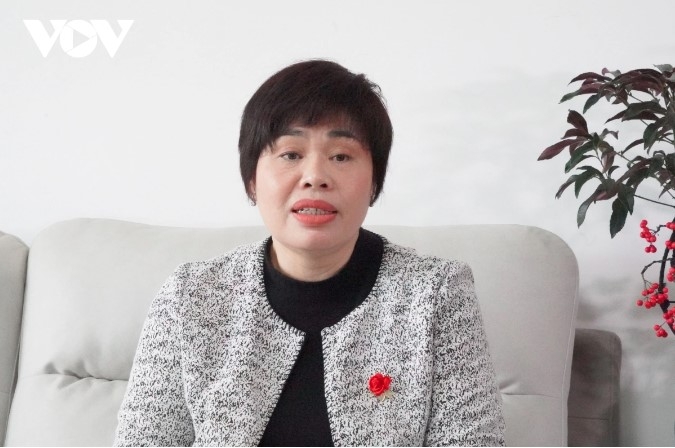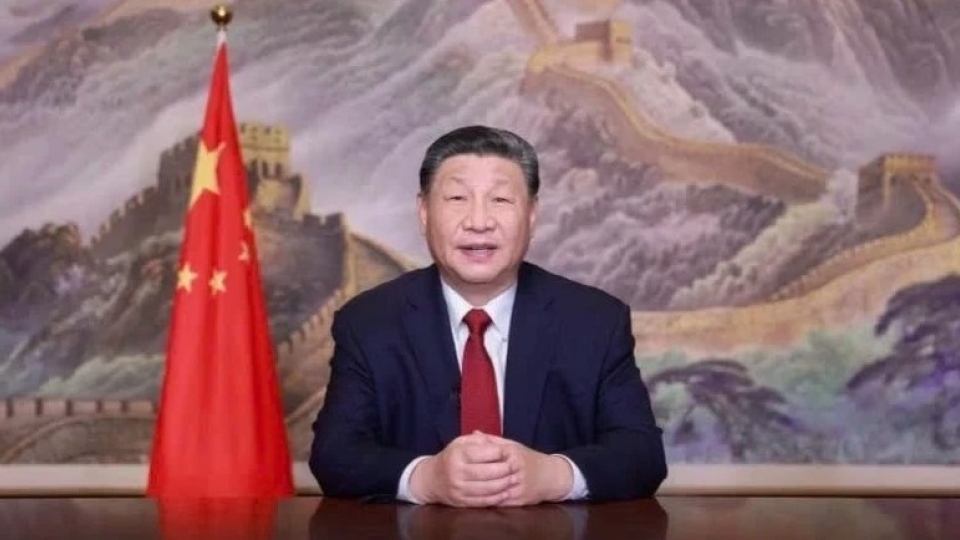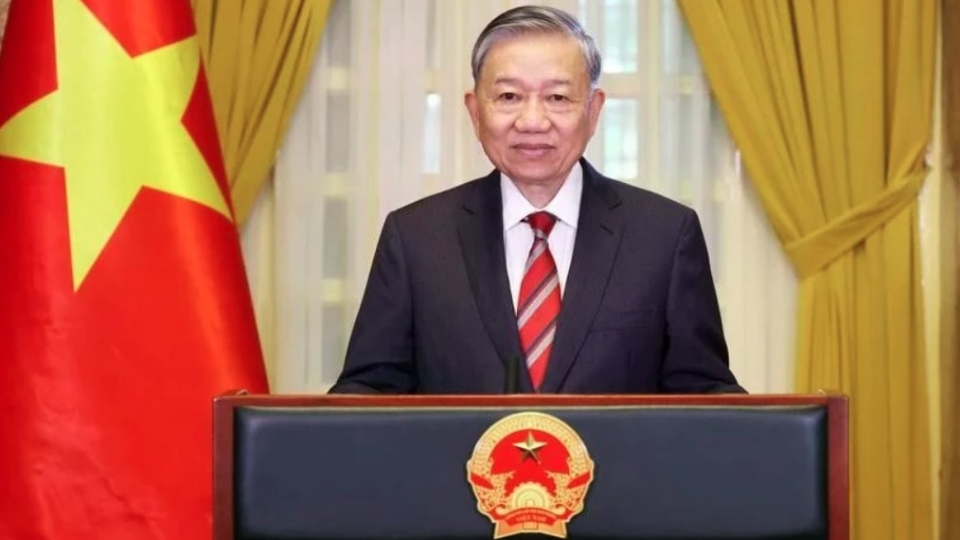Vietnam is Xi Jinping's first overseas destination in 2025
VOV.VN - The visit to Vietnam by General Secretary of the Communist Party of China (CPC) and President Xi Jinping marks the beginning of China’s top-level diplomatic activities in 2025. It is his first overseas trip of the year, with Vietnam being the first destination.

On the occasion of the top Chinese leader’s visit to Vietnam, Professor Pan Jin’e, a senior fellow at the Institute of Marxism under the Chinese Academy of Social Sciences and an expert on Vietnam studies, granted an interview to VOV’s resident correspondent in Beijing.
Starting point for China’s head-of-state diplomacy
Reporter: What is the significance of General Secretary Xi Jinping’s visit to Vietnam strengthening and deepening bilateral ties between the two Parties and the two countries?
Professor: General Secretary Xi Jinping has paid four official visits to Vietnam since 2015, showing the high importance that both he and China place on the country and bilateral relations
This visit marks the start of China’s head-of-state diplomacy in 2025. It is his first foreign trip this year, and Vietnam is the first country he visits. This clearly reflects China's diplomatic priorities, particularly, its emphasis on neighborhood diplomacy, with Vietnam being a top priority within that framework. It underscores the special importance China attaches to its relationship with Vietnam.
The Communist Party of China recently held its Central Conference on work relating to foreign affairs with neighboring countries. At the event, General Secretary Xi emphasized that neighborhood diplomacy should be regared as a central and strategic task, with the goal of achieving shared prosperity with neighboring nations. Vietnam, as a close and important neighbor, naturally holds a very special place in that vision.
This visit builds on the three previous visits by General Secretary Xi Jinping. In December 2023, China and Vietnam agreed to build a “community with a shared future that carries strategic significance.” Since then, the top leaders of both Parties have exchanged visits three times in just over a year.
In 2024, General Secretary To Lam visited China, further upgrading the comprehensive strategic cooperative partnership and advancing the building of the community with a shared future between China and Vietnam. A wide range of cooperation agreements were signed.
This year, I believe that the two sides will continue to build on that momentum and sign new agreements across various aspects. I expect substantive breakthroughs in practical cooperation.
Humanistic exchanges vital to bilateral relations
Reporter: How do you view the role of humanistic exchanges, especially as this year marks the 75th anniversary of diplomatic ties and has been designated as the Year of Humanistic Exchange?
Professor: I believe people-to-people exchanges are of great importance. Before visiting Vietnam, President Xi Jinping has repeatedly stated: “The state-to-state relationship depends on the closeness of the people, and that closeness is built on mutual understanding.” Enhancing mutual understanding between our peoples is a key goal and the highest priority of China’s diplomacy. Only when people understand each other can they build connections in all areas, including infrastructure and economic and trade relations. This is the foundation and ultimate goal of friendly cooperation.
Over the years, China and Vietnam have made tremendous efforts in this area, and the results are increasingly evident. I’ve been a long-time member of the China-Vietnam People’s Forum. Apart from the pandemic years, we’ve held the forum annually for over a decade. It has served as an important platform for citizen diplomacy, where we can discuss existing issues and explore future directions for cooperation.
The China-Vietnam Youth Festival has also been held regularly. Young people represent the future of both countries. If they can foster mutual understanding and friendship, it will benefit not only the present but also serve as a meaningful way to carry forward our traditional ties.
We all know that in the early 1920s, President Ho Chi Minh came to China to prepare for the founding of the Communist Party of Vietnam. His footprints could still be found in many Chinese border provinces like Guangdong, Guangxi, and Yunnan. I believe historical sites associated with President Ho Chi Minh in China can become shared heritage spaces that both sides can further explore.
We have already undertaken some work in this regard. Last year, I worked with China Central Television (CCTV) to help script and organize a three-part documentary titled Ho Chi Minh in China. The series will air in the coming days. I believe this is a meaningful and concrete example of promoting cultural exchanges and mutual understanding.

A few days ago, a dialogue involving media representatives, youth, and businesspeople from both countries was held. This was highly significant, as the media plays a crucial role. In China, the media serves as the voice of the Party and also of the people. Through media exchange, we can better understand each other’s concerns, especially those of the younger generation. When differences or misunderstandings arise, such platforms can help improve understanding and consolidate trust.
I also hope China will broadcast more programs about Vietnam. Vietnam’s culture, language, and literature are rich and compelling. For instance, The Tale of Kieu is an outstanding work of Vietnamese literature. Its translated versions have circulated in many countries. In China, my teacher Zhao Yulan translated it into Chinese. I remember that when President Truong Tan Sang visited China in 2013, my teacher personally presented him with that Chinese edition. I was there as well, and I was honored to receive a beautiful white porcelain plate from Vietnam as a gift.
Another area of cooperation worth exploring is culture. A Vietnamese friend once told me they were eager to visit China to learn about restoring ancient cultural relics, with a view to better preserving and promoting Vietnam’s own heritage. I think this is another promising avenue for cooperation.
Reporter: Cooperation through the Party channel plays a special role in bilateral relations. In your opinion, how can we enhance the effectiveness of this cooperation channel in the future?
Professor : As we all know, the uniqueness between China and Vietnam is reflected in an important feature: both are socialist countries led by the Communist Party. In other words, the Party plays a leadership, guidance, and direction-setting role for the development of both countries. This is a very important commonality between us, as it determines all aspects of cooperation and creates strategic consistency. Therefore, I believe that the cooperation in this regard is very important.
In practice, it has been proven that, over many decades, the relationship between the two Parties has led the direction of the development of bilateral relations. This year marks the 75th anniversary of the two countries’ diplomatic relations, and it is also the Year of China-Vietnam Humanistic Exchanges.
The 75 years of diplomatic relations have shown that, during important historical periods, reciprocal visits between the leaders of the two Parties have shaped and determined the direction of bilateral relations in the next phase.
In the future, I believe there is still room for the development of this cooperation. This time, General Secretary Xi Jinping is visiting Vietnam and meeting with Vietnamese leaders. They will play a very important leadership role in the future development of both countries. Therefore, we must boost the development of bilateral relations based on the strategic consensus reached by the leaders of the two Parties and countries after discussions on domestic and international issues.
The Communist Party of Vietnam will convene its 14th National Congress next year. After the 14th Congress, Vietnam will enter a new era- a period of the nation’s rise. We are highly interested in how Vietnam will develop in the future, and thus hope to engage in mutual learning and exchanges.
Another important area is translation and mutual study of each other’s leaders’ works. Xi Jinping’s thought on state governance has taken shape in China, and these works have now been translated into Vietnamese.
At the same time, I have assisted scholars in proofreading the Chinese edition of the book Some theoretical and practical issues on socialism and the path toward socialism in Vietnam by late General Secretary Nguyen Phu Trong.
This book has now been translated into Chinese. Many in China hold it in high regard, as it offers a comprehensive understanding of General Secretary Trong’s ideology. In the future, I also hope that the works of General Secretary To Lam will be translated, thus enabling scholars like us in China to better understand the new thinking of the Communist Party of Vietnam's leadership.
Another aspect is academic exchange. We have done extensive research on Xi Jinping’s Thought and are ready to share our findings with Vietnamese scholars. Likewise, we hope Vietnamese researchers will discuss with us and co-organize theoretical seminars. High-level leaders of the two Parties are already holding theoretical conferences annually on a rotational basis, and this year’s edition will take place in Vietnam. In addition, Vietnam will host the 12th International Forum on Socialism this year, another valuable platform.
Furthermore, I hope to promote scholar exchanges within the academic community and encourage short-term visits at various levels. I also wish to see more Vietnamese students studying in China, gaining insight into the Party’s thought and participating in academic exchanges. I believe there remains ample room for further cooperation between the two sides.
Reporter: Thank you so much.




